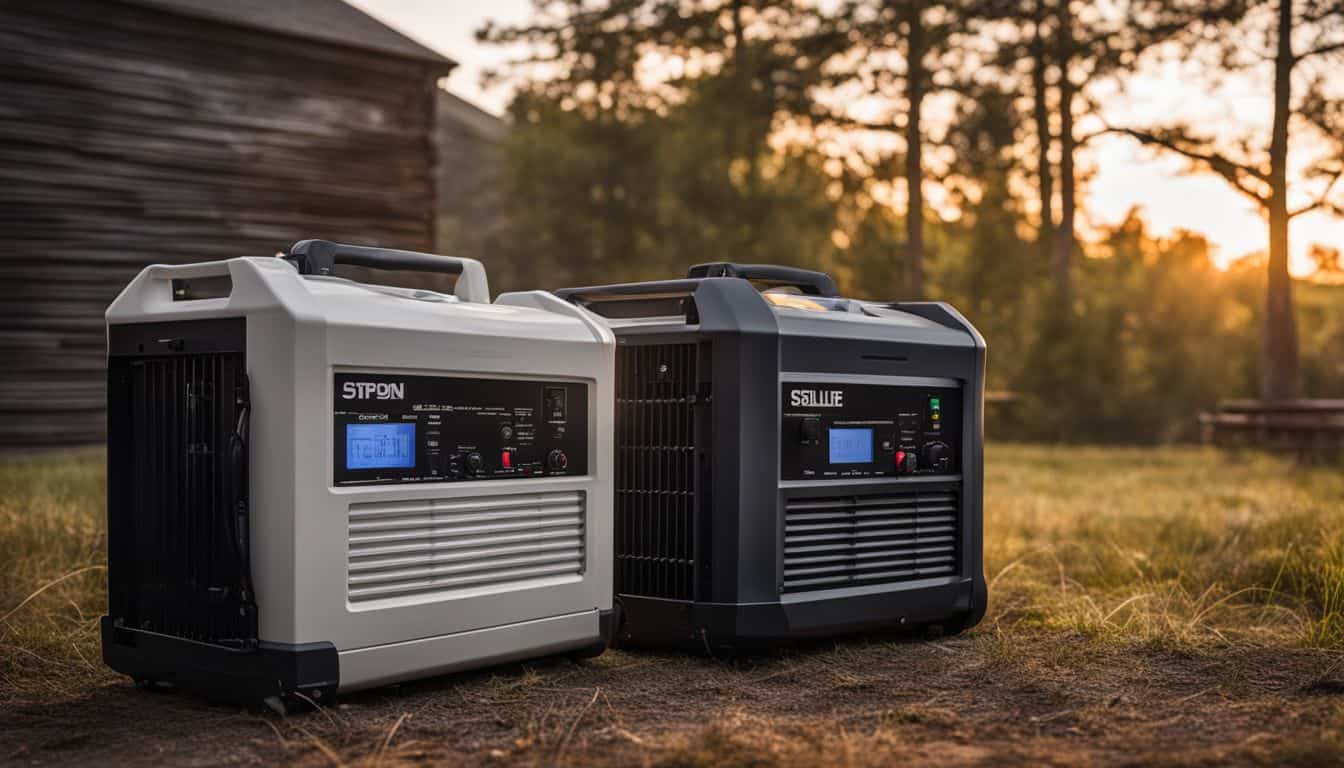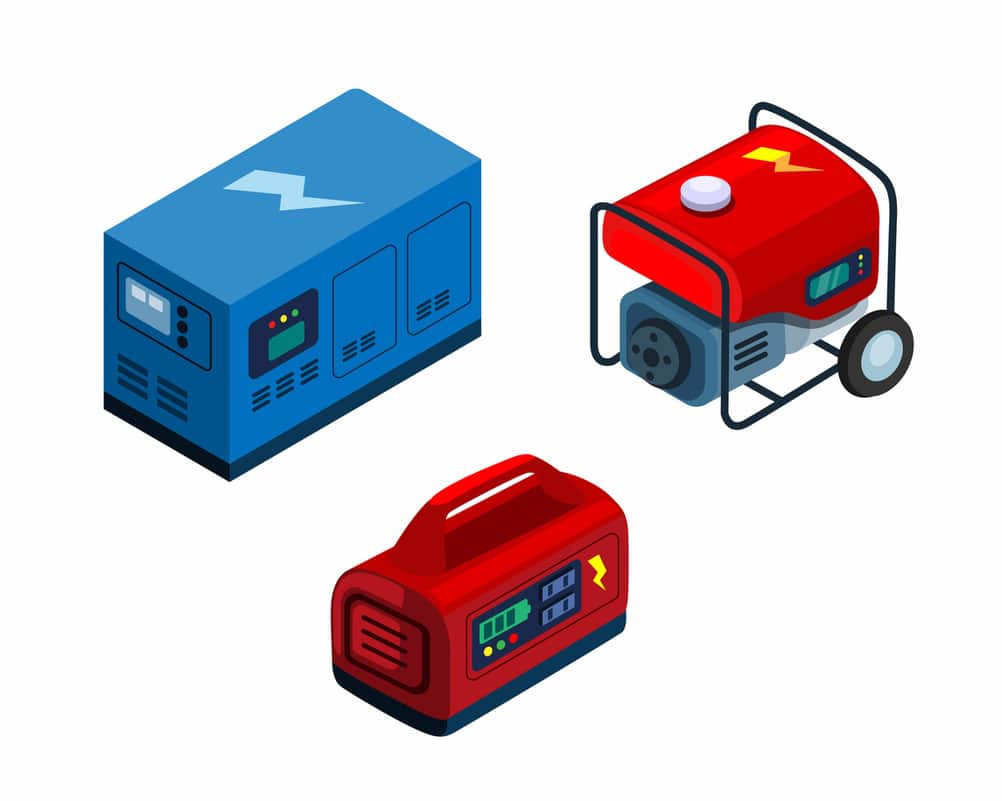Because reliable power is crucial for everyday life and outdoor adventures, generators have emerged as indispensable devices. This guide delves into the three primary categories of generators—gas, diesel, and solar—offering insights into their unique advantages, potential drawbacks, and optimal applications. By exploring these options, we aim to equip you with the knowledge to select the perfect power solution for your needs.
Gas Generators
Gas generators are the most common type of portable power source. They work by burning gasoline to power an internal combustion engine, which drives an alternator to produce electricity.
Advantages
- Widely available fuel: Gasoline is easily accessible at most gas stations.
- Lower initial cost: Gas generators are typically less expensive upfront than diesel or solar options.
- Portable and easy to use: They’re generally lightweight and straightforward to operate.
Disadvantages
- Noisy operation: Gas generators can be loud, which may be an issue in residential or quiet outdoor settings.
- Regular maintenance required: They need frequent oil changes and fuel system maintenance.
- Environmental concerns: Gasoline combustion produces emissions and can pose spill risks.
Diesel Generators
Diesel generators operate similarly to gas generators but use diesel instead of gasoline.
Advantages
- More fuel-efficient than gas: Diesel engines typically consume less fuel per kilowatt-hour of energy produced.
- Longer lifespan: Diesel engines are known for their durability and longevity.
- Better for continuous operation: They can run for extended periods without overheating.
Disadvantages
- Higher initial cost: Diesel generators are often more expensive than gas models.
- Noisier than gas generators: They tend to produce a louder, deeper sound.
- Environmental impact: While more efficient, diesel fuel still produces emissions and potential spill hazards.
Solar Generators
Solar generators, also known as portable power stations, use solar panels to capture sunlight and convert it into electrical energy, which is then stored in a battery for later use.
Advantages
- Clean, renewable energy: Solar generators produce no emissions during operation.
- Silent operation: They work noiselessly, making them ideal for quiet environments.
- Low maintenance: With no moving parts, they require minimal upkeep.
- No fuel costs: Once purchased, they can generate power for free.
Disadvantages
- Higher upfront cost: Solar generators and their accompanying panels can be expensive initially.
- Dependent on sunlight: Their effectiveness is reduced in cloudy conditions or at night.
- Lower power output: They typically can’t match the output of fuel-powered generators.
For those new to generators, our guide on the basics of portable generators explained provides a solid foundation for understanding these power sources.
Cost Comparison
Initial costs vary significantly, with gas generators usually being the least expensive, followed by diesel, and then solar. However, operational costs tell a different story. Gas and diesel generators require ongoing fuel purchases and maintenance, while solar generators have minimal operational costs after the initial investment.
Long-term, solar generators often prove more cost-effective, especially in areas with ample sunlight. However, for infrequent use or in less sunny regions, fuel-powered generators might be more economical.
Environmental Impact
Solar generators clearly lead in environmental friendliness, producing no emissions during operation. Gas and diesel generators both contribute to air pollution and greenhouse gas emissions, with diesel generally being slightly more efficient but potentially producing more particulate matter.
Performance and Reliability
Gas and diesel generators typically offer higher power output and can run continuously as long as fuel is available. Solar generators, while limited by sunlight availability and battery capacity, offer reliable, clean power for lower-demand applications.
For those interested in combining the benefits of different fuel types, dual fuel portable generators offer an interesting compromise, allowing the use of either gas or propane.
Maintenance and Longevity
Gas and diesel generators require regular maintenance, including oil changes, filter replacements, and fuel system care. Solar generators, with their lack of moving parts, require minimal maintenance beyond keeping the solar panels clean.
In terms of longevity, diesel generators often last the longest, followed by gas generators. Solar generators’ lifespan is primarily determined by their battery life, which can vary but is generally quite long with proper care.
Best Use Cases
- Gas Generators: Ideal for occasional use, emergency backup power, and situations where portability is key.
- Diesel Generators: Best for frequent or continuous use, construction sites, and large power demands.
- Solar Generators: Perfect for camping, outdoor events, and environmentally sensitive areas. Also excellent for small, consistent power needs in sunny locations.

Conclusion
Choosing between gas, diesel, and solar generators depends on your specific needs, budget, and environmental concerns. Gas generators offer affordability and convenience, diesel provides power and efficiency for heavy-duty use, while solar generators offer clean, quiet operation with minimal ongoing costs.
Consider your power requirements, usage frequency, location, and environmental impact when making your decision. Each type has its place, and understanding their strengths and weaknesses will help you choose the best power solution for your needs.
FAQs
What are the main types of generators compared in this article?
The article compares three main types of generators:
- Gasoline generators
- Diesel generators
- Solar generators
What are the key benefits of gasoline generators?
Gasoline generators have several advantages:
- They are portable and easy to move around
- Well-suited for powering small appliances and tools
- Generally more affordable upfront than diesel or solar
In what situations are diesel generators a good choice?
Diesel generators are ideal for certain applications:
- Powering larger equipment and heavy-duty tasks
- Providing longer run times and durability than gas generators
- Operating reliably in cold weather conditions
What makes solar generators an appealing option?
Solar generators have some unique benefits:
- Completely clean energy with zero emissions and no pollution
- Silent operation without the noise of combustion engines
- No fuel costs – the sun provides free renewable energy
What is a downside of solar generators?
One challenge with solar generators is their reliance on sunlight. Output can be reduced in cloudy weather or shaded areas. Solar generators need ample sun exposure to produce their maximum rated power.
How do the costs compare between gas, diesel and solar generators?
In general, solar generators have a higher upfront price than comparable gas or diesel models. However, they have no ongoing fuel costs which can lead to savings over time. Gas generators are usually the most affordable to purchase initially.
What should I consider when choosing between the different generator types?
Some key factors to think about when selecting a generator:
- The amount of power output needed for your specific use case
- Portability requirements – how large/heavy of a unit can you accommodate
- Fuel costs, availability, and storage needs
- The environmental impact and emissions of the different options
- Noise levels if operating in populated areas or at night

Leave a Reply